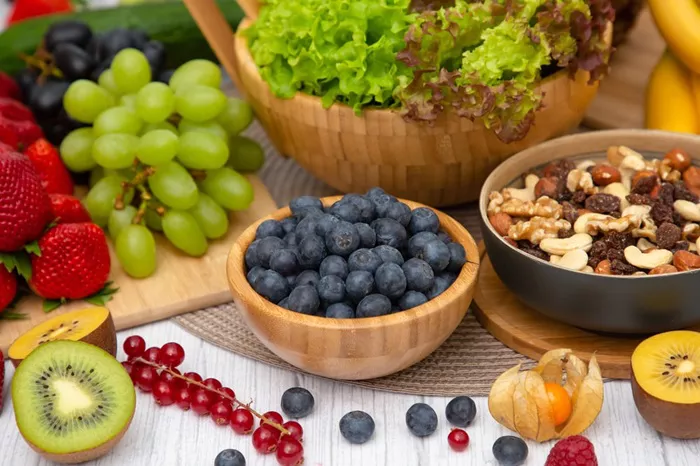Maintaining a healthy diet is essential to achieving overall well-being. The food we consume plays a pivotal role in how our bodies function, our energy levels, and our mental clarity. So, what should you eat per day to stay healthy? This article explores the key components of a balanced diet, with a special focus on foods that support your fitness goals.
Understanding a Balanced Diet
A balanced diet consists of a variety of foods from different food groups. It includes adequate proportions of carbohydrates, proteins, fats, vitamins, and minerals to support the body’s nutritional needs. When you eat well, you provide your body with the energy it needs to function effectively throughout the day.
Carbohydrates: Your Energy Source
Carbohydrates are one of the primary sources of energy for your body. They are converted into glucose, which fuels your muscles and brain. It’s important to choose complex carbohydrates over simple sugars to maintain steady energy levels throughout the day. Some healthy carbohydrate sources include:
- Whole grains like oats, quinoa, and brown rice
- Vegetables, especially leafy greens and starchy ones like sweet potatoes
- Legumes like beans and lentils
Complex carbohydrates provide long-lasting energy and are rich in fiber, which is important for digestion and maintaining a healthy weight.
Proteins: Building Blocks for Muscle Repair
Proteins are crucial for muscle repair, immune function, and hormone production. If you’re regularly working out or engaging in physical activities, protein intake becomes even more important. High-quality protein sources include:
- Lean meats like chicken, turkey, and fish
- Plant-based proteins like tofu, tempeh, and edamame
- Eggs and dairy products such as Greek yogurt and cottage cheese
For those looking to optimize their fitness goals, protein consumption after exercise is especially important to help with muscle recovery and growth. Healthy gym meals should focus on protein-rich foods to maximize these benefits.
Fats: Essential for Hormonal Balance
Healthy fats are essential for maintaining hormonal balance, brain function, and the absorption of fat-soluble vitamins like vitamins A, D, E, and K. Some of the best sources of healthy fats include:
- Avocados
- Olive oil and coconut oil
- Nuts and seeds
- Fatty fish such as salmon and mackerel
While fats are often considered unhealthy in some diets, the key is to focus on unsaturated fats, which provide numerous health benefits and help maintain good cholesterol levels.
The Importance of Hydration
Water is an essential component of every bodily function. Hydration helps regulate temperature, supports digestion, and aids in nutrient absorption. It’s important to drink water consistently throughout the day, especially if you’re active or exercising. Aim for at least eight 8-ounce glasses of water per day, or more if you’re engaging in intense physical activity.
Drinks like herbal teas, coconut water, and even water-rich fruits and vegetables (like cucumbers and watermelon) can also help keep you hydrated.
What Should I Eat After a Workout?
Post-workout nutrition is critical for muscle recovery and energy replenishment. After exercising, the body needs to refuel to recover from the strain it has undergone. This is where healthy after-gym meals come into play. The ideal post-workout meal should include a combination of proteins and carbohydrates. A good example would be:
- Grilled chicken with quinoa and steamed vegetables
- Greek yogurt with mixed berries and a drizzle of honey
- A protein shake with banana and almond butter
These meals not only provide the necessary protein for muscle repair but also offer carbohydrates to restore glycogen levels, ensuring you have enough energy for the rest of the day.
Eating Throughout the Day
To stay healthy, it’s important to maintain a regular eating schedule that aligns with your body’s needs. This means eating three main meals a day, along with healthy snacks in between, if needed. Here’s a general idea of what your daily eating schedule might look like:
Breakfast
Start your day with a nutrient-dense meal that will provide lasting energy. A balanced breakfast might include:
- Oats with chia seeds, berries, and a handful of almonds
- Scrambled eggs with spinach and avocado
- Whole grain toast with nut butter and a side of fruit
Lunch
Lunch should consist of a balance of lean protein, healthy fats, and complex carbohydrates. Here are some lunch ideas:
- Grilled chicken salad with mixed greens, olive oil, and quinoa
- Brown rice bowl with salmon, avocado, and vegetables
- Vegetable stir-fry with tofu and a side of whole-grain rice
Dinner
Dinner should be lighter but still satisfying. A healthy dinner could include:
- Grilled fish with roasted sweet potatoes and broccoli
- Turkey chili with beans and vegetables
- Vegetable curry with chickpeas and brown rice
Snacks
If you need a snack, opt for nutrient-dense options like:
- Greek yogurt with a handful of mixed nuts
- Carrot sticks with hummus
- An apple with almond butter
Foods to Limit or Avoid
While it’s important to focus on healthy food choices, there are some foods that should be limited in your diet. These include:
- Processed foods high in sugar and unhealthy fats
- Refined grains like white bread and pastries
- Fried foods
- Excessive consumption of sugary beverages like sodas and juices
Minimizing these foods will help improve overall health and contribute to better energy levels and a healthier weight.
Conclusion
To stay healthy, you need a well-balanced diet that includes a variety of nutrients. Focus on whole, nutrient-dense foods such as lean proteins, complex carbohydrates, healthy fats, and plenty of water. Eating meals that support your fitness goals and recovery, like healthy gym meals and healthy after-gym meals, will help you feel energized and promote muscle recovery. Prioritize a routine that includes regular meals and snacks, and avoid processed and sugary foods to achieve optimal health.
Related Topics:
Should I Eat Protein or Carbs Before a Workout


